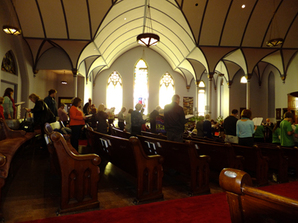Our Name Change
|
Our Name Change On September 18, 2011, we changed our name from The First Baptist Church of Granville to The United Church of Granville. Our new name comes from our commitment to each other and to the multiple denominations to which we now belong. Today's congregation is honored to follow in the footsteps of the pioneers who founded this church. Their spirit is our foundation.
We helped establish Denison University. In the years since then, we have followed our call to work for peace, justice and human rights around the world, including movements to abolish slavery, support the ordination of women, and establish civil rights for all people. The United Church of Granville is a diverse congregation. Some of us were raised Baptist; most were not. The result is an energizing mix of backgrounds, ages, abilities, ethnicities, sexual orientations and beliefs. When we roll all that into a Sermon Talkback or an adult Sunday School class, we get some stimulating discussions. We have long been an ecumenical, or uniting, congregation. Though our roots are in the American Baptist tradition, we value and appreciate the history and traditions of other denominations. We long for a day when “all can be one” and, in this spirit, we regularly cooperate with a number of churches and service agencies in Licking County and beyond to do God’s work. |
Our recent affiliation with The United Church of Christ reflects this uniting spirit. We’re also part of the progressive Alliance of Baptists, the Baptist Peace Fellowship of North America and the Association of Welcoming and Affirming Baptists.
|
An Historic, Ecumenical and United Church
|
Julie Reiswig
(read at the Name Change Ceremony) We’ve come a long way down the road as First Baptist Church – and I’m here to shine a light on the path behind us. There are a few waypoints I think you should know about, just some highlights of a long and storied congregation. We began as the “Baptist Church of Christ in Granville and St. Albans,” a group of 19 men and women who met in a barn in 1819. Granville itself was a fledgling community of people who had made their way from Massachusetts to settle in the "Western Wilderness," as Ohio was called. In 1848 the name was shortened to First Baptist Church, and it’s been nearly 200 years that we’ve stood for Freedom of Conscience and Soul Liberty, concepts most Baptists embrace. Our congregation has been closely aligned with Denison University from its first classes held in our church building in 1831. By 1859 our pastor and his wife responded to Denison’s refusal to admit women by starting their own college for women, also in our church building. Many early presidents of the college also served as pastor to our congregation, and the school itself was a Baptist institution until the 1960’s. An early church member you should know about is William Whitney. He came to Granville in 1832 to attend Denison, joined our congregation, and we licensed him to “preach the Gospel.” In those days, Granville was bubbling with anti-slavery agitation, and William Whitney jumped right into the pot. The news of the day called him “an obnoxious abolitionist lecturer.” As a student, he was one of the anti-slavery speakers who sparked the Granville Riot of 1836. Granville was a known stop on the Underground Railroad, and since almost nobody was keeping records about their own illegal participation, we have to make a few logical extrapolations (Wally Chessman would have cautioned me about making this leap, but here I go). There’s not a single word about anti-slavery in our church records of that era. Our church’s claim to the Underground Railroad lies in the assumption that a man impassioned to fight a moral injustice would turn to his church for support, drawing inspiration from his God and his spiritual family. What better place to find sympathetic hands? |
Later in his adult life, Whitney was our church clerk for many years. His handwriting fills pages of records, which he signed with John Hancock flourish. He was an early model for committee over-participation, taking all manner of assignments and responsibilities, such as “providing the meetinghouse with firewood at 75 cents a cord”. William Whitney died over 100 years ago, but his passionate spirit resonates in our church today. During the 1800’s we would have had to purchase “slips or pews… for the purpose of paying our ministers salary,” which was, by the way, $400 a year. The “Assessing Committee” was charged to “make out a plan of the slips of the house, number and price them, appoint a day of sale, and give public notice.” And if you didn’t fill your “slip” on Sunday morning, you might be added to the list of “delinquents.” One record entry announces a new plan to meet for “Prayer and Humiliation,” probably not a big draw if Dwight were to offer it today. The old language is not always so charming. They were harsh with members who behaved badly, and with some frequency they “withdrew the right hand of fellowship” for various offenses such as traveling on the Sabbath, dancing, intoxication, using profane language or simply attending parties. And remember that baptisms were not performed indoors, but rather in the Raccoon Creek. One record states that Baptism would be postponed until the next Sabbath “owing to the day being stormy.” That was in February! You had to really mean it to ask for Baptism in February in Ohio. Our Archives include written and visual information from the founding of the church till the present.
We are in the process of making these available on line. Here is BOOK ONE transcription from the very beginning 1819 (PDF download) |
Information on the stained glass windows here


